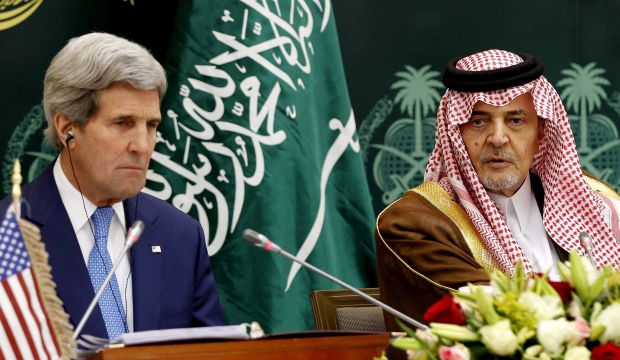Recent remarks by US Secretary of State John Kerry about Washington “having” to negotiate with Syrian President Bashar Al-Assad mark a significant turning point in the course of the Syrian crisis.
Today Kerry is talking about the outcomes of the Geneva I conference as providing a suitable framework for a way out of the Syrian crisis, a position similar to the one adopted by Russia, the Syrian government’s main backer.
The justification for this shift was offered by CIA Director John O. Brennan who said that Washington and its allies are concerned about the disintegration and fall of the Syrian state into the hands of extremist armed groups.
Such a shift would certainly not have been expected before September 23, 2014, the date when the US launched airstrikes over Syria.
But the about-face now seems completely logical as Washington has moved from merely being an ally of the Syrian opposition and a sponsor of the Geneva conference, to a direct partner in the war.
We are then facing a new scene in Syria. The US is calling for negotiations with Damascus while it continues to refuse to recognize the role of groups it considers extremist despite their accounting for most of the opposition’s military efforts. Meanwhile, Iraq is witnessing a form of military understanding between Washington and Tehran which may serve as a model for a political one between Washington and Moscow in Syria. In other words, the Syrian arena is witnessing a radical shift in positions, something that will no doubt lead to a regressive shift in opposition ranks. The most prominent embodiment of this shift may take the form of the emergence of a new opposition lineup mainly consisting of groups that advocate negotiating with the government, such as the internal opposition, the National Coordination Committee, and the political current of Moaz Al-Khatib, the oppositionist who led the Syrian National Coalition in late 2012.
What concerns us in this regard is the role that Arabs may assume in the Syrian crisis. Over the past four years, Arab states have been divided between a minority that either sympathized with or backed the government, and a majority that distanced itself from the conflict. What is certain is that any form of negotiation between the two sides in the conflict will be sponsored by Washington and Moscow, with Tehran and the EU likely playing either a direct or indirect role. As for the role of Arab states, that remains unclear.
By an Arab role I do not mean a kind of celebratory participation, as was the case in the Geneva I and II conferences. Rather, I am calling on Arab states to take the initiative by putting forward a solution that guarantees an exit strategy from the crisis, to be followed by another one aimed at rehabilitating the new state, which is to incorporate all parties in the Syrian conflict.
My justification for this call is that any development in the Syrian crisis would definitely have repercussions on the political situation in the region as a whole and affect the current regional balances. It makes no sense that Arab states continue to wait for what decisions others will make.
It is understandable that Arab support is necessary to any deal between the Syrian opposition and government. In fact, no solution can be reached in Syria without the backing of Arab states. Nevertheless, the lack of effective and early participation may limit our role to merely giving our blessings to what others end up agreeing on. In order for our role to be effective, Arab states must put forward an initiative, perhaps led by key Arab countries such as Saudi Arabia, Egypt and Algeria, and adopted by the Arab League on behalf of all Arab states.
In this context, I call on each of the three said countries to appoint a special representative to participate in formulating the future initiative. Why those three countries specifically? Because each of them has links to the main players in the conflict and at the same time enjoys a degree of respect on regional and international levels, characteristics required in any effective partner.
The Arab situation is far from rosy, but we do not lack the necessary competence to work out solutions for our crises. What we need today is to start taking the initiative and abandon our policies of procrastination, which have made us partners in responsibility for what has happened instead of being partners in producing and investing in solutions.
